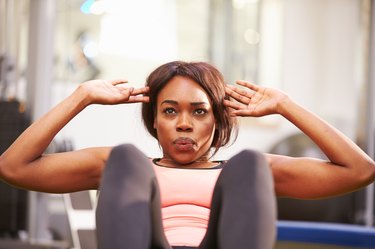
Any time you try a new exercise that your body is not adjusted to, you can expect some muscle soreness. After your workout, pain may be triggered by certain movements or by bodily functions such as sneezing or coughing. Most of these pains are common and short-lived, but some may be symptoms of a larger problem. Learn ways to avoid soreness and which symptoms signal a need for medical attention.
Delayed Muscle Soreness
Video of the Day
Delayed Muscle Soreness, or DMS is the pain you experience in your muscles after an intense workout. This soreness is not a sign of being "out of shape," but an indicator that you have increased the intensity of your exercise routine, lengthened the time you spent working out or performed movements that are unfamiliar to you. Usually, pain sets in the day after your workout and starts to diminish within three days. You will notice pain when you use the same muscles that were overused during exercise. So, contracting your abdominal muscles while coughing might cause you pain after sit-ups if that exercise is new to you, or if your body is not accustomed to doing the 30 sit-ups that made you sore.
Video of the Day
Muscle Strain
Slightly more serious than DMS is a muscle strain resulting from abdominal muscles being stretched or torn from vigorous movements such as sit-ups. They are classified as first, second or third degree strains, with third involving complete muscle tear; the more severe a strain, the greater the medical risks. Third degree strains in abdominal muscles may allow intestinal tissue to protrude through, causing a hernia. Athletic training, including sit-ups, is a likely culprit for abdominal strains if you are overweight or out of shape. Such a strain would result in pain when you cough, sneeze or otherwise use your abs.
Treatment
Several treatments may provide temporary relief from pain, but will not shorten the duration of delayed muscle soreness. Stretching may help to alleviate some discomfort from your abdominal muscles. Lie on your stomach and lift your upper body while tightening your bottom. Hold this stretch for 20 to 30 seconds. Lie on your back and let your bent right leg drop across your body while you twist your upper torso to the right. Hold this for 15 to 30 seconds and switch to the left. For minor strains, apply ice for 20 minutes several times throughout the day. If your strain seems more severe or you suspect hernia, seek medical attention, as surgery may be required for full recovery. Press a pillow on your abdominal wall when you feel the need to cough and avoid twisting, jarring movements until you have healed.
Resuming Exercise
Fortunately, delayed muscle soreness should not be a problem once your body has adapted to doing 30 sit-ups. To avoid unnecessary pain, increase your workout duration and intensity gradually, allowing your body to catch up with the additional stress of new or more demanding movements. Even with strains, your doctor will likely encourage you to continue exercising, using pain as your gauge to decide how much your body can handle.